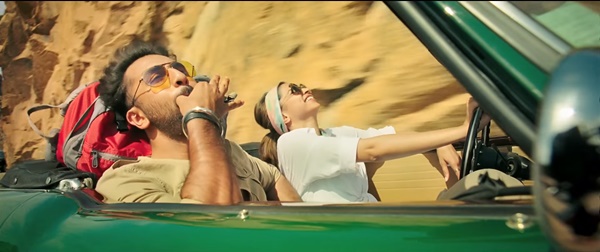The opening stretch of Imtiaz Ali’s latest film, Tamasha, takes some of the biggest risks of any film I’ve seen all year. Opening with a metaphorical gambit that’s downright bizarre (Ranbir Kapoor as a tin man on a treadmill?!) that announces the film’s “all the world’s a stage” conceit, Tamasha then segues into an extended stay in Corsica where the film introduces its two main characters.
The Corsica section of Tamasha is something of a high-wire act. Ranbir Kapoor and Deepika Padukone meet cute, and then decide not to tell each other their names or anything about themselves. He’ll be Don, she’ll be Mona, and together they’ll spin out a fiction worth living. Pretending to be international bank robbers, they take on Corsica with nothing but their imagination. Ali asks his actors to do a lot of the heavy lifting in this sequence, and they respond beautifully. These are characters without context, making up backstories as they go along. They interact with the vistas, the bars and restaurants, the people, and create merriment everywhere they go. Kapoor and Padukone carry this section thanks to their movie star charisma and natural chemistry. The whole thing has a feel of a screwball Bollywood Rivette and it’s pretty fascinating.
Once the film leaves Corsica, there’s no choice but to return to the quotidian world, where characters must explain themselves, and motivations must take over. Padukone’s Mona, revealed to be called Tara, yearns for the freedom she experienced in Italy, and tracks down Kapoor’s Ved. The Kapoor character then takes center stage, and his fate becomes the main question of the film.
Ranbir Kapoor is a talented performer, and while he’s very good here, one often senses a struggle that he has with the material. The second half of the film focuses on Ved’s repressed emotions slipping through the cracks of his persona. Tamasha observes Ved in his daily routine, at his workplace, hanging out with friends, going out on dates; Ved frequently composes himself in front of mirrors, arranging the features he’ll present to the world. But the relationship with Tara forces things. What Kapoor is asked to portray in these sequences is not unlike some sort of bipolar episode wherein he struggles to keep repressed his true passions and desires, exploding with gnashed-teeth anger at random intervals. It’s not a natural feel for Kapoor: everything about it feels performed, calculated; but it’s just as artificial as the work he does in the Corsica section, just aiming for a different effect. Regardless, Ali isn’t exactly interested in the prosaic reasoning behind Ved’s personality eruptions; it’s a more romantic, metaphoric notion. The inner being must express itself somehow, whether you are a cab driver or a product manager.
Tamasha’s Ved is someone who can no longer exist in the world. Beginning with a variety of jumbled images and snippets of recreated myths and stories, the film begins to piece together Ved’s background: a boy in love with telling stories who somewhere along the way let the world swallow him up. Tara demands to be with the wild and carefree Don of Corsica, but Ved can’t be that person again. Tamasha, like Ali’s earlier film, Rockstar, is about finding a way to exist in the world. For Kapoor’s Jordan in the earlier film, it meant finding solace in the arms of the woman he loved, and returning to that place when the real world proved too much. For Ved, it’s about returning to his original passion and being true to the person he wants to be. So, we return to Robot Ranbir Kapoor on a treadmill, Deepika Padukone as the clown who acts as his heart, and the overarching metaphor that must be explained to the audience.
Although this is still a mainstream Bollywood release, it’s a work that that’s very hard to grasp. It’s a slippery film, resisting easy categorizations, morphing before your eyes. Structurally and rhythmically, it can be a challenging film. It sometimes deals with ever-growing crescendos, like the build up to the “Matargashti” number which releases all the energy that had been built up during the Corsica sequence; other times, it drags moments out past their breaking point (a key scene set in a restaurant, and an extended storytelling sequence near film’s end). It simply doesn’t move how you think it will and at times this can be thrilling.
We are six films into the Imtiaz Ali project, and it seems like each new film throws us some new curveballs. His first couple of films are more or less traditional romantic comedies. Jab We Met is one of the best of its kind. Something changes around Love Aaj Kal and the characters become pricklier, the distances greater, the chronology trickier. Rockstar is the ambitious hot mess passion project, where love becomes a transcendent force that forever alters lives. Ali’s characters here are more abstract and their actions are imbued with more metaphorical heft. Highway is something else altogether, an atmospheric road picture with a strange, troubling relationship at its core that’s improbably moving.
What becomes clearer with each passing film is that Imtiaz Ali is becoming more and more of a romantic filmmaker. His characters are dreamers, wanderers, passionate lovers, who must somehow find a way to live with the harsh realities of the world around them. The films don’t often move in logically sound ways, but their emotions resonate. And following Ali’s journey from film to film is one of the most rewarding activities of contemporary cinephilia.
Tamasha is currently playing at Cinemark Lincoln Square, Regal Meridian 16 and Regal Parkway Plaza




